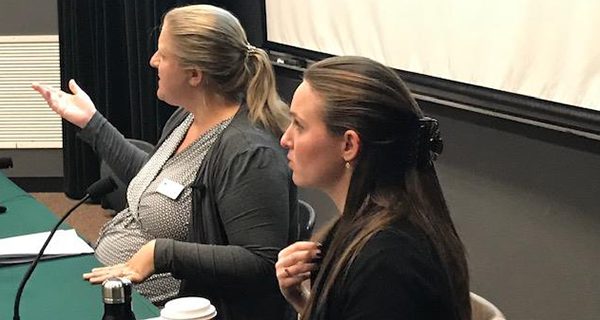[ccfic caption-text format="plaintext"]
“How do you limit social media use when it’s such a big part of how kids socialize today?”
“How do you set age-appropriate limits for your children when you have kids of different ages in your home?”
“Do reward systems for screen use end up encouraging more screen use by kids?”
These were some of the questions posed by parents last week at a presentation entitled, “Limit Setting in the Age of Technology: Effective Strategies for Kindergarten Through 8th Grade” at Westwood High School. Hosted by Judge Baker Children’s Center, in collaboration with Westwood Youth & Family Services and the Westwood School System, the presentation aimed to help parents understand the brain science behind screen time addiction, and then give them concrete tools and resources for finding the right balance between school-required usage and personal use.
The presentation began with some sobering facts: teens consume an average of 9 hours of entertainment media daily, while tweens (ages 8-12) average 6 hours per day, not including time spent for school or homework. The amount of time matters when it comes to brain development. Studies found that those teens who average 10 hours or more per day develop structural changes to their brain that can impact their ability to manage their cognitive and emotional behaviors. This could disrupt their sleep patterns, and may lead to symptoms of depression and anxiety.
Getting kids to buy into the idea that screens can be harmful, however, is a big challenge. To win them over, parents need to start having conversations with their kids as early as possible to impress upon them that managing screen time is as important to caring for their bodies as nutrition and physical exercise. The goal is to make the idea of limiting screen time second nature.
In the same way getting kids to eat vegetables can be a negotiated process of learning, so, too, can screen time management. The panelists also offered some practical tips, as well as some resources, to help. First, parents should avoid negotiating with kids over screen time and instead set clear expectations. They must also be prepared to role model the behavior themselves. For example, establish how much screen time is too much time for the family, and then have everyone stick to it, or create a chore and reward menu so that there are clear guidelines.
Some families also use family media contracts to help establish guidelines. Common Sense Media and Screenagers are two examples of websites that offer support to families.
The three-person panel included Todd Danforth, Ph.D., School Psychologist, E.W. Thurston Middle School Licensed Psychologist in the Commonwealth of Massachusetts; Danielle Sutton, M.S.W., LICSW, Director at Westwood Youth and Family Services; and Sarah A. Tannenbaum, Psy.D., Associate Director, Summer Enrichment Institute and Staff Psychologist, Center for Effective Child Therapy, Judge Baker Children’s Center.
The presentation was the first in a speaker series offered by Judge Baker Children’s Center, which is hosting a series of free discussions to raise awareness about important topics in children’s mental health care and development.























